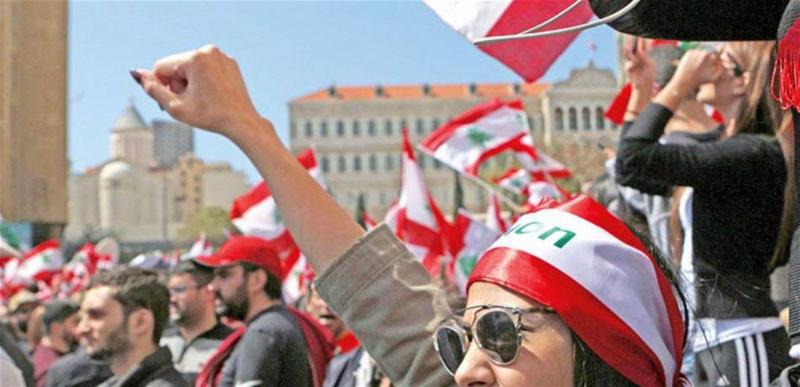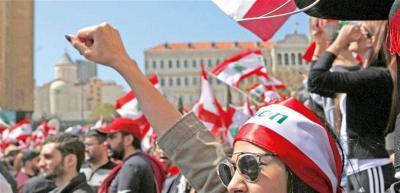Social, economic, and health crises have erupted simultaneously in Lebanon, spilling out onto the streets in protest against a record rise in the dollar exchange rate. This has led institutions to close to limit losses, amid power and water outages and unprecedented increases in fuel prices, paralleled by a escalation from the healthcare sector against banking procedures.
Protests have returned to the streets, with roadblocks reported in parts of the capital, Beirut, yesterday afternoon, followed by limited protests in the southern city of Sidon, which included a temporary blocking of the Beirut-Sidon highway before it was reopened. Meanwhile, the caretaker government is unable to find solutions and is preoccupied with conflicts among its ministers regarding the electricity plan and the telecommunications sector, as well as the drug crisis and hospitals that remain open to all possibilities.
The crises exploded against the backdrop of the dollar exchange rate reaching around 36,000 Lebanese pounds per dollar, forcing shop owners to close their doors to curb losses. Some view the current situation as a harbinger of what may lie ahead in the coming days. Financial and economic expert Marwan Iskander noted that "daily facts indicate that the country is witnessing a phase of falling into the abyss." He warned in a statement to "Asharq Al-Awsat" that "a broad popular explosion is imminent, as the political authority has distanced itself from addressing the crises." He lamented that "the statements of the government of President Hassan Diab and later the government of President Najib Mikati talked about reform programs, but they remained ink on paper." He emphasized that "rescue begins by addressing the electricity file, which caused the financial collapse, and contracting with private companies to provide electricity and put an end to the lethal bleeding."
For the past four days, the country has been experiencing near-total power outages, which have affected water supplies that rely on electricity and the rising costs of the diesel that powers the pumps.
Tragedy does not stop at the loss of the simplest essentials for a dignified life; it extends to increasing emigration. Iskander pointed out that "the deliberate impoverishment of the Lebanese is being translated into more emigration of the educated and young talents we rely on in the recovery phase." He asked, "Is the ruling authority aware that the American University of Beirut has lost more than 150 doctors and university professors in the past few months? Isn't it sad that Lebanon, the first country to develop a telecommunications network and the first in the Middle East to introduce mobile phones, is now witnessing the collapse of this vital sector?"
Protests have not only affected the majority of citizens who are living below the poverty line, but they have also reached the medical and healthcare sector. Hundreds of doctors gathered yesterday at the entrance of the Central Bank of Lebanon and blocked the road in protest against banks refusing to pay their dues via checks or credit cards, and their inability to withdraw their salaries from ATMs, which threatens a serious social catastrophe and puts doctors in a position where emigration seems inevitable.
Nicolas Abou Sharaf, the head of the Doctors' Syndicate, indicated that matters "have reached a dangerous stage." He called for "an end to these illegal, inhumane, and unethical actions." Meanwhile, Dr. Suleiman Haroun, head of the private hospitals' syndicate, stated that hospitals "are unable to secure liquidity to continue their operations and secure the rights of their workers, as well as to purchase medicines and medical equipment, which poses a danger to patients' lives." He urged President Michel Aoun, Prime Minister Najib Mikati, and the elected parliament to "bear their responsibilities in light of the collapse of the healthcare sector."
Bakery owners also protested in front of the Ministry of Economy, demanding that wheat be secured for mills and that a pricing system be established for bread that fits the exchange rate. Protesters also called on the new parliament to expedite the approval of the World Bank loan law to support wheat. Nasser Sourour, Secretary of the Bakery Syndicate in Beirut and Mount Lebanon, stated, "Our problem is significant because it concerns the bread, and the political class has closed most of the country's institutions without any problem for us to also close."
The economic and financial crises reflect a political dilemma. Former Justice Minister Ibrahim Najjar believes that the catastrophic situation exceeds all expectations, noting that "the people have lost hope in this hopeless authority, which continues to fight over allocations and shows no concern for the pains of citizens." He confirmed in a statement to "Asharq Al-Awsat" that the country "is facing a complete bankruptcy at the level of governance, the presidency, and political leaderships, with the only hope resting with the new deputies and the reformist bloc and its allies who emerged from the suffering of the people." He believes that "the essential tasks for these deputies lie in unifying the dollar exchange rate, curbing the black market, restructuring the banks, and immediately addressing the electricity crisis that keeps Lebanese citizens awake at night."
Despite signs that the Lebanese are heading for worse days ahead amid deep divisions and discussions of a potential governmental void followed by a presidential vacancy, Minister Najjar called for "an urgent conclusion to the election of a Speaker of Parliament and to initiate parliamentary consultations to bring in a new Prime Minister who does not have economic interests or connections to banks and who is not corrupt." He stressed the necessity of "expediting the formation of a constitutional government with complete titles capable of confronting and addressing crises immediately."




